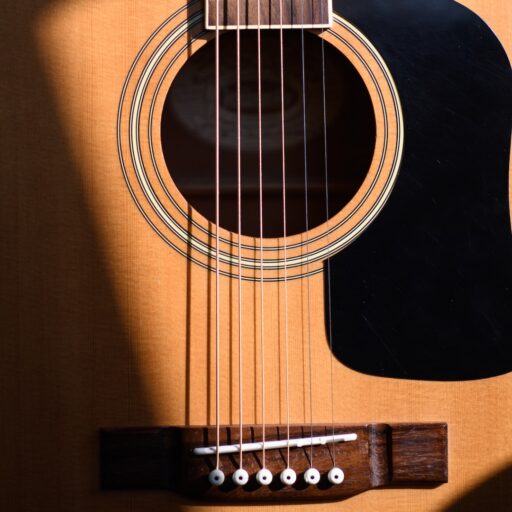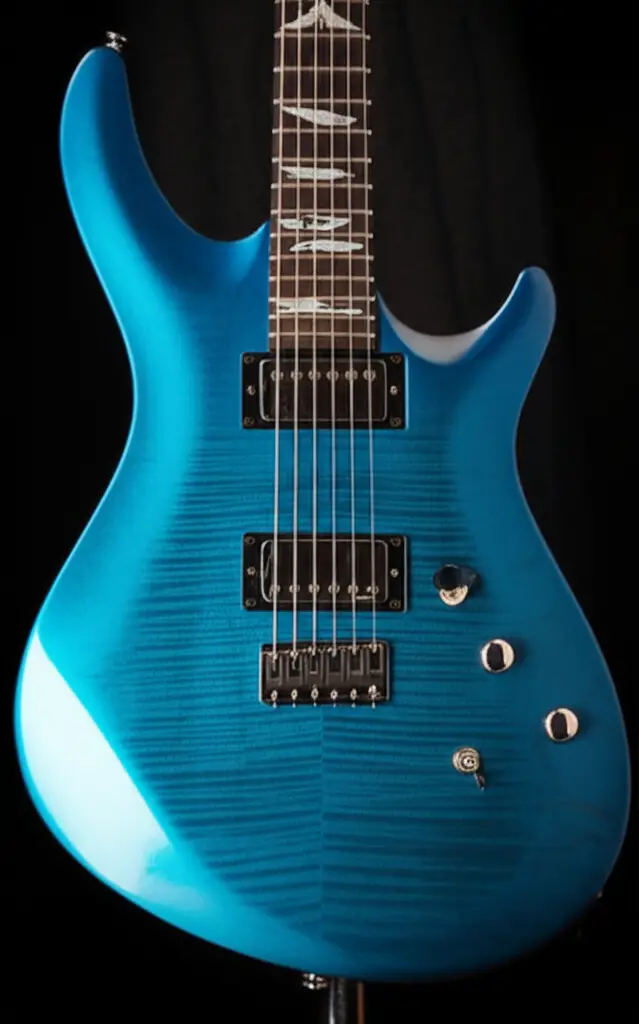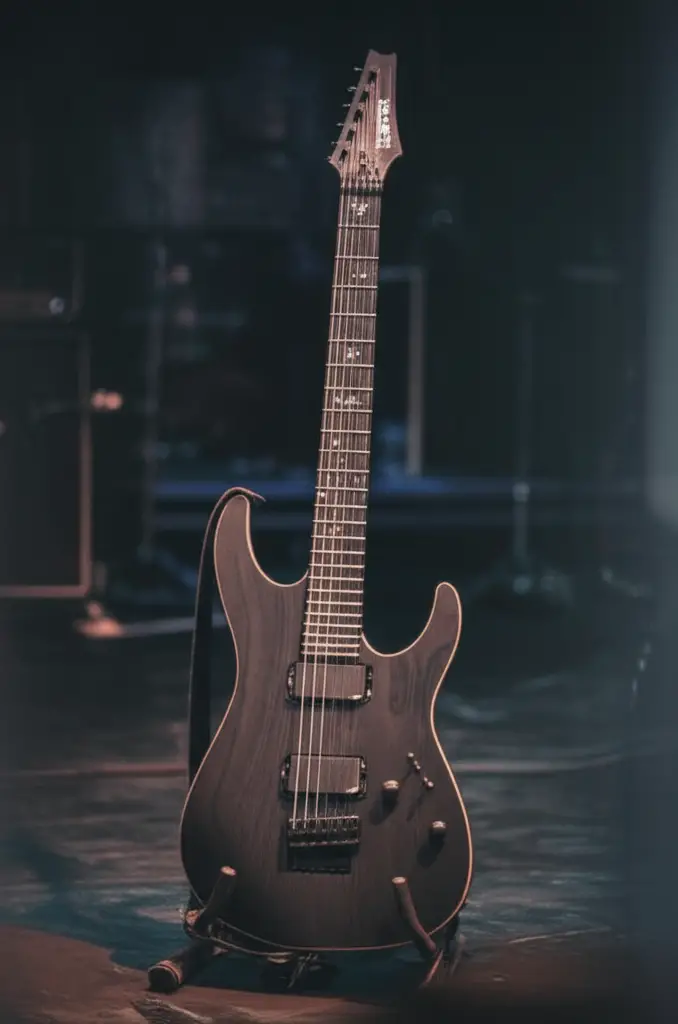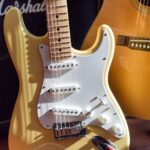Support our educational content for free when you purchase through links on our site. Learn more
🎸 What Are the Top 9 Guitar Brands You Must Know in 2025?
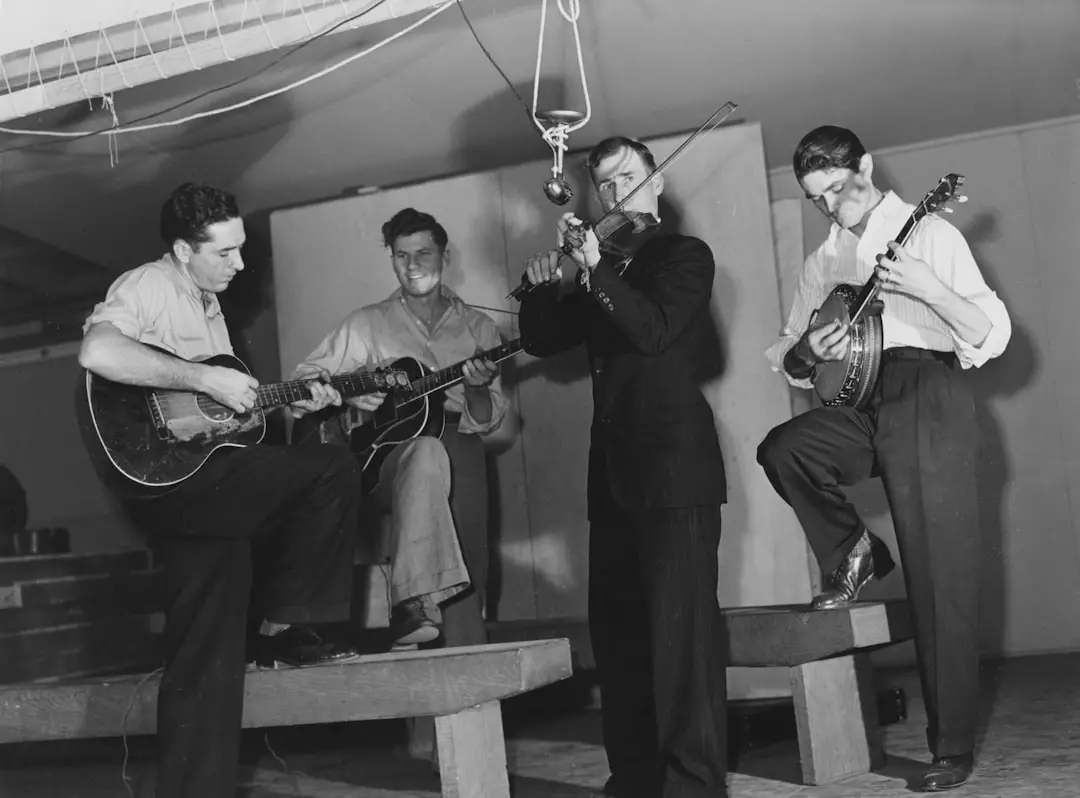
Ever wondered why some guitars feel like magic in your hands while others just don’t inspire? The secret often lies in the brand behind the instrument. From the legendary tones of Gibson and Fender to the modern innovations of Taylor and PRS, the world of guitar brands is vast and fascinating. Did you know that the first mass-produced solid-body electric guitar was introduced by Fender in the 1940s, forever changing music history? But what makes these brands stand out, and which one is right for you?
In this article, we’ll take you on a deep dive into the top 9 guitar brands dominating 2025, exploring their unique designs, signature sounds, and who they’re best suited for. Whether you’re chasing that vintage blues vibe, shredding metal solos, or crafting heartfelt acoustic melodies, we’ve got you covered. Stick around as we unravel the craftsmanship, innovation, and stories behind these iconic names — and help you find your perfect guitar soulmate.
Key Takeaways
- Gibson and Fender remain the gold standards for classic electric guitar tones and legendary designs.
- Martin and Taylor lead the acoustic world with unmatched craftsmanship and innovative playability.
- PRS and Ibanez offer boutique quality and genre-specific excellence, from jazz to metal.
- Yamaha and Epiphone provide reliable, budget-friendly options without sacrificing quality.
- Choosing the right brand depends on your musical style, budget, and personal comfort.
- Proper setup and maintenance are just as crucial as brand when it comes to playability and tone.
Ready to explore your dream guitar?
- 👉 Shop Gibson Guitars: Amazon | Gibson Official
- Explore Fender Models: Amazon | Fender Official
- Discover Taylor Acoustics: Amazon | Taylor Official
Dive in and let’s find the guitar brand that will ignite your passion and elevate your sound!
Table of Contents
- ⚡️ Quick Tips and Facts About Top Guitar Brands
- 🎸 The Evolution of Guitar Brands: From Vintage Roots to Modern Icons
- 🔥 Why Choosing a Quality Guitar Brand Transforms Your Playing Experience
- 👀 Sneak Peek: The Most Popular and Influential Guitar Brands in 2025
- 1. 🎩 Gibson: The Timeless Legend of Electric and Acoustic Guitars
- 2. 🎸 Fender: The Unrivaled King of Electric Guitars and Iconic Sounds
- 3. 🎶 Martin: The Acoustic Guitar Brand That Defines Warmth and Craftsmanship
- 4. 🌟 PRS Guitars: Boutique Excellence and Modern Versatility
- 5. 🤘 Ibanez: The Go-To Brand for Metalheads and Shred Masters
- 6. 🎤 Yamaha: Reliable Quality for Beginners and Pros Alike
- 7. 🎵 Epiphone: Affordable Classics with Gibson Heritage
- 8. 🎸 Gretsch: Vintage Vibes and Rockabilly Flair
- 9. 🎼 Taylor Guitars: Innovation Meets Acoustic Brilliance
- 🔍 How to Choose the Right Guitar Brand for Your Style and Budget
- 🎯 Top Features to Look for in Premium Guitar Brands
- 🎸 The Impact of Guitar Brand on Resale Value and Collectability
- ⚙️ Custom Shop vs. Mass Production: What’s Best for You?
- 🎤 Famous Guitarists and Their Go-To Brands: Inspiration and Influence
- 🎵 Maintenance Tips to Keep Your Guitar Brand New
- 💡 Insider Secrets: How Guitar Brands Innovate to Stay Ahead
- 🎸 Guitar Brand Myths Debunked: What You Really Need to Know
- 🎯 Quick Comparison Table: Top Guitar Brands at a Glance
- 📝 Conclusion: Finding Your Perfect Guitar Brand Match
- 🔗 Recommended Links for Guitar Enthusiasts
- ❓ Frequently Asked Questions About Guitar Brands
- 📚 Reference Links and Resources
⚡️ Quick Tips and Facts About Top Guitar Brands
Welcome to the ultimate guide on top guitar brands! Whether you’re a newbie strumming your first chords or a seasoned shredder chasing that perfect tone, knowing the right brand can make or break your musical journey. Here are some quick nuggets from the Guitar Brands™ team to get you started:
- Brand matters: It’s not just a logo — it’s craftsmanship, sound quality, and reliability.
- Vintage vs. modern: Some brands excel in classic tones (Gibson, Fender), others innovate with tech and playability (Taylor, PRS).
- Price ≠ quality always: Affordable brands like Epiphone and Yamaha offer fantastic value.
- Genre-specific favorites: Metalheads swear by Ibanez; blues lovers adore Gibson; acoustic purists lean Martin or Taylor.
- Resale value: Big names hold value better — a Gibson Les Paul or Fender Stratocaster can be an investment.
- Playability: Neck shape, weight, and body style vary widely — try before you buy!
Did you know? The first electric guitar was introduced by Rickenbacker in the 1930s, forever changing music history. 🎸 Curious how brands evolved since then? Keep reading!
For a deep dive into guitar buying, check out our Guitar Buying Guide.
🎸 The Evolution of Guitar Brands: From Vintage Roots to Modern Icons
Guitar brands are like rock legends themselves — they have stories, ups and downs, and moments of pure genius. Let’s take a quick tour through history to see how the giants of guitar making came to be.
The Early Days: Birth of Iconic Brands
- Gibson (1902): Started as a mandolin maker, Gibson revolutionized electric guitars with the Les Paul in 1952, a model that remains a holy grail for rockers.
- Fender (1946): Leo Fender’s innovation brought the first mass-produced solid-body electric guitars — the Telecaster and Stratocaster — shaping the sound of rock, blues, and country forever.
- Martin (1833): The acoustic pioneer, famous for its X-bracing and premium tonewoods, Martin set the standard for acoustic guitars worldwide.
Modern Innovations and Boutique Brands
- Taylor (1974): Known for blending modern manufacturing with handcrafting, Taylor introduced the patented NT neck and innovative body shapes that appeal to contemporary players.
- PRS (1985): Paul Reed Smith guitars combine boutique craftsmanship with versatile tone, favored by players from jazz to metal.
- Ibanez (1908): Originally a Japanese importer, Ibanez became the go-to brand for shred guitarists with their thin necks and aggressive pickups.
The Rise of Affordable and Mid-Range Brands
- Epiphone: Gibson’s budget-friendly sibling, offering classic designs at accessible prices.
- Yamaha: Known for consistent quality and great beginner guitars, Yamaha bridges the gap between affordability and performance.
Want to explore the history of a specific brand? Dive into our Guitar Brand Guides for detailed stories.
🔥 Why Choosing a Quality Guitar Brand Transforms Your Playing Experience
You might wonder, “Why fuss over brands? Isn’t a guitar just a guitar?” Oh, if only it were that simple! The brand you pick influences your tone, comfort, and even your motivation to practice. Here’s why:
1. Sound Quality and Tone Consistency
Top brands use premium woods, pickups, and hardware that deliver rich, balanced tones. For example, a Gibson Les Paul’s mahogany body and humbuckers produce a warm, sustaining sound that’s hard to replicate cheaply.
2. Build Quality and Durability
Brands like Martin and PRS are known for meticulous craftsmanship. Their guitars withstand years of gigging and travel without losing tone or playability.
3. Playability and Comfort
Neck profiles, fretboard radius, and body contours vary by brand. Fender Stratocasters are famous for their slim necks and ergonomic bodies, perfect for fast playing.
4. Resale and Investment Value
A well-maintained Taylor or Gibson can retain or even increase in value, making your guitar a potential asset.
5. Brand Reputation and Support
Buying from a reputable brand means better customer service, warranty, and access to official parts and upgrades.
Pro tip: Always try guitars in person if possible — even the best brand won’t suit every hand or style.
👀 Sneak Peek: The Most Popular and Influential Guitar Brands in 2025
Ready for the headliners? Here’s a quick look at the brands dominating the guitar world right now, each with its own flavor and fanbase:
| Rank | Brand | Specialty | Signature Models | Ideal For |
|---|---|---|---|---|
| 1 | Gibson | Classic electric & acoustic | Les Paul, SG, ES-335 | Rock, blues, jazz |
| 2 | Fender | Electric guitars & basses | Stratocaster, Telecaster, Jazzmaster | All genres, versatile |
| 3 | Martin | Premium acoustic guitars | D-28, OM-28, 000-15 | Acoustic purists, folk |
| 4 | PRS | Boutique electric guitars | Custom 24, McCarty, SE series | Rock, jazz, metal |
| 5 | Ibanez | Metal and shred guitars | RG series, S series | Metal, shred, fusion |
| 6 | Taylor | Modern acoustic guitars | 814ce, GS Mini, Builder’s Edition | Acoustic players, innovators |
| 7 | Yamaha | Reliable all-rounders | Pacifica, Revstar | Beginners to pros |
| 8 | Epiphone | Affordable Gibson copies | Les Paul Standard, Casino | Budget-conscious players |
| 9 | Gretsch | Vintage-style electrics | G5420T Electromatic, White Falcon | Rockabilly, country, jazz |
| 10 | Godin | Innovative hybrids | Session, LGXT | Experimental, versatile |
Want to see how these brands stack up in detail? We’re diving into the top players next!
1. 🎩 Gibson: The Timeless Legend of Electric and Acoustic Guitars
| Aspect | Rating (1-10) |
|---|---|
| Design | 9 |
| Tone Quality | 10 |
| Playability | 8 |
| Build Quality | 9 |
| Innovation | 7 |
| Value for Money | 7 |
Design & Aesthetic
Gibson guitars are synonymous with classic rock and blues. The iconic Les Paul with its carved maple top and sunburst finish is a visual and sonic masterpiece. The SG offers a lighter, sharper alternative with a double-cutaway design.
Tone and Sound
Thanks to humbucker pickups and mahogany bodies, Gibsons deliver a thick, warm tone with incredible sustain. Blues legends like B.B. King and rock gods like Slash swear by them.
Playability
Gibson necks tend to be chunkier than Fender’s, which some players love for stability, others find less nimble. The fretwork is generally excellent, but the weight can be hefty.
Build Quality & Craftsmanship
Made in the USA with premium woods, Gibsons are built to last. However, some players note variability in quality control in recent years.
Drawbacks
- Heavier than many competitors.
- Pricey for beginners.
- Some models have neck profile quirks.
User Story: Our team member Jake swears by his 1959 Les Paul reissue for studio work, calling it “a tone monster that inspires every note.”
👉 CHECK PRICE on:
2. 🎸 Fender: The Unrivaled King of Electric Guitars and Iconic Sounds
| Aspect | Rating (1-10) |
|---|---|
| Design | 9 |
| Tone Quality | 9 |
| Playability | 10 |
| Build Quality | 8 |
| Innovation | 9 |
| Value for Money | 8 |
Design & Iconic Models
The Stratocaster and Telecaster are arguably the most recognizable guitars worldwide. Fender’s sleek, contoured bodies and three single-coil pickups on the Strat offer versatility and comfort.
Tone and Sound
Fender guitars are known for their bright, twangy tones — perfect for country, blues, and rock. The Telecaster’s sharp attack contrasts with the Strat’s smooth shimmer.
Playability
Fender’s slim necks and ergonomic design make them a favorite for fast players and beginners alike. The tremolo system on the Strat adds expressive possibilities.
Build Quality & Innovation
Made in the USA and Mexico, Fender offers a range of quality levels. Their innovations include the Noiseless pickups and Player Plus series.
Drawbacks
- Single-coil pickups can be noisy (hum).
- Some players find the tone too bright for heavier genres.
User Story: Sarah, a gigging blues player, says, “My Fender Strat is like an extension of my hand — it just feels right every time.”
👉 Shop Fender on:
3. 🎶 Martin: The Acoustic Guitar Brand That Defines Warmth and Craftsmanship
| Aspect | Rating (1-10) |
|---|---|
| Design | 8 |
| Tone Quality | 10 |
| Playability | 8 |
| Build Quality | 10 |
| Innovation | 7 |
| Value for Money | 7 |
Design & Craftsmanship
Martin’s solid wood bodies, especially the D-28 dreadnought, are legendary for their rich, balanced tone. Their use of scalloped bracing enhances resonance and sustain.
Tone and Sound
Expect deep bass, sparkling highs, and a full midrange. Martin acoustics are often the go-to for studio recording and folk legends.
Playability
Martin necks are comfortable but tend to be wider, which some players find challenging initially.
Build Quality
Handcrafted in the USA with premium tonewoods like Sitka spruce and East Indian rosewood, Martin guitars are built to last generations.
Drawbacks
- Pricey for beginners.
- Some models are heavy.
- Less variety in electric-acoustic models compared to competitors.
User Story: Emily, a folk singer-songwriter, says, “My Martin D-28 is my songwriting partner — it just sings with every strum.”
👉 CHECK PRICE on:
4. 🌟 PRS Guitars: Boutique Excellence and Modern Versatility
| Aspect | Rating (1-10) |
|---|---|
| Design | 9 |
| Tone Quality | 9 |
| Playability | 9 |
| Build Quality | 10 |
| Innovation | 9 |
| Value for Money | 8 |
Design & Aesthetic
PRS guitars are known for their sleek, elegant finishes and bird inlays on the fretboard. The Custom 24 is a flagship model blending classic and modern styles.
Tone and Sound
PRS offers a versatile tone palette — from warm jazz to aggressive rock. Their proprietary pickups deliver clarity and punch.
Playability
PRS necks are smooth and fast, with a comfortable 25″ scale length that appeals to many players.
Build Quality
Handcrafted in Maryland, USA, PRS guitars are built with obsessive attention to detail and premium woods.
Drawbacks
- Higher price point than mass-market brands.
- Some players prefer traditional single-coil tones over PRS humbuckers.
User Story: Mark, a fusion guitarist, says, “My PRS is my Swiss Army knife — it covers every style I throw at it.”
👉 Shop PRS on:
5. 🤘 Ibanez: The Go-To Brand for Metalheads and Shred Masters
| Aspect | Rating (1-10) |
|---|---|
| Design | 8 |
| Tone Quality | 9 |
| Playability | 10 |
| Build Quality | 8 |
| Innovation | 9 |
| Value for Money | 8 |
Design & Style
Ibanez guitars scream modern metal with sleek, aggressive body shapes and thin, fast necks. The RG series is a staple for shredders.
Tone and Sound
High-output pickups and versatile electronics make Ibanez perfect for heavy distortion and fast leads.
Playability
Ibanez necks are among the fastest on the market, with slim profiles and smooth fretboards designed for speed.
Build Quality
Japanese and Indonesian factories produce Ibanez guitars with consistent quality, though some budget models vary.
Drawbacks
- Not ideal for vintage tone seekers.
- Some players find the thin necks less comfortable for rhythm playing.
User Story: Alex, a metal guitarist, shares, “My Ibanez RG is like an extension of my fingers — it’s built for speed and aggression.”
👉 CHECK PRICE on:
6. 🎤 Yamaha: Reliable Quality for Beginners and Pros Alike
| Aspect | Rating (1-10) |
|---|---|
| Design | 7 |
| Tone Quality | 8 |
| Playability | 8 |
| Build Quality | 9 |
| Innovation | 7 |
| Value for Money | 9 |
Design & Versatility
Yamaha offers a wide range from beginner-friendly Pacifica electrics to professional Revstar models. Their designs are clean and functional.
Tone and Sound
Yamaha guitars provide balanced tone suitable for many genres, making them excellent all-rounders.
Playability
Comfortable neck profiles and solid hardware make Yamaha guitars easy to play for beginners and experienced players.
Build Quality
Known for consistency and durability, Yamaha guitars often punch above their weight in quality.
Drawbacks
- Less “character” or signature tone compared to boutique brands.
- Some models feel generic in design.
User Story: Mia, a teacher, says, “Yamaha gave me a reliable guitar that I could recommend to my students without hesitation.”
👉 Shop Yamaha on:
7. 🎵 Epiphone: Affordable Classics with Gibson Heritage
| Aspect | Rating (1-10) |
|---|---|
| Design | 7 |
| Tone Quality | 7 |
| Playability | 7 |
| Build Quality | 7 |
| Innovation | 6 |
| Value for Money | 9 |
Design & Legacy
Epiphone offers budget-friendly versions of Gibson classics like the Les Paul Standard and Casino. While not identical, they capture the spirit.
Tone and Sound
Epiphone guitars have decent tone for the price, with humbuckers that approximate Gibson warmth.
Playability
Good for beginners and intermediate players, though some report variability in fretwork.
Build Quality
Made in Asia, quality control is decent but not as rigorous as Gibson’s.
Drawbacks
- Not as refined as Gibson models.
- Some hardware and finish issues reported.
User Story: Tom, a beginner, says, “My Epiphone Les Paul got me through my first gigs without breaking the bank.”
👉 CHECK PRICE on:
8. 🎸 Gretsch: Vintage Vibes and Rockabilly Flair
| Aspect | Rating (1-10) |
|---|---|
| Design | 9 |
| Tone Quality | 8 |
| Playability | 7 |
| Build Quality | 8 |
| Innovation | 7 |
| Value for Money | 7 |
Design & Style
Gretsch guitars are known for their retro looks, hollow bodies, and Bigsby tremolos. Models like the White Falcon and Electromatic are iconic.
Tone and Sound
They deliver a bright, twangy tone perfect for rockabilly, country, and jazz.
Playability
Hollow bodies can be bulky and feedback-prone at high volumes, but the necks are comfortable.
Build Quality
Made in the USA and Asia, quality varies by model but generally solid.
Drawbacks
- Not ideal for heavy distortion.
- Feedback can be an issue live.
User Story: Brian, a rockabilly fan, says, “My Gretsch is my secret weapon for that vintage vibe.”
👉 Shop Gretsch on:
9. 🎼 Taylor Guitars: Innovation Meets Acoustic Brilliance
| Aspect | Rating (1-10) |
|---|---|
| Design | 9 |
| Tone Quality | 9 |
| Playability | 10 |
| Build Quality | 9 |
| Innovation | 10 |
| Value for Money | 8 |
Design & Innovation
Taylor is famous for its modern manufacturing techniques, patented NT neck, and sleek body shapes like the Grand Auditorium.
Tone and Sound
Bright, clear, and balanced tone with excellent projection. Taylor’s use of innovative tonewoods adds unique flavor.
Playability
Taylor necks are slim and comfortable, making them favorites for fingerstyle and flatpicking.
Build Quality
Consistent high quality with excellent finish and attention to detail.
Drawbacks
- Some players find Taylor tone too bright or “modern.”
- Pricey for entry-level models.
User Story: Lisa, a fingerstyle player, says, “Taylor’s playability and tone let me express every nuance.”
👉 CHECK PRICE on:
🔍 How to Choose the Right Guitar Brand for Your Style and Budget
Choosing a guitar brand is like picking a musical soulmate. Here’s a step-by-step guide to help you find your perfect match:
Step 1: Identify Your Genre and Playing Style
- Blues/rock? Look at Gibson and Fender.
- Metal/shred? Ibanez and Jackson are your friends.
- Acoustic/folk? Martin and Taylor shine here.
Step 2: Set Your Budget
- Entry-level: Yamaha, Epiphone, Squier (Fender’s budget line).
- Mid-range: PRS SE series, Taylor Academy.
- Premium: Gibson USA, PRS Core, Martin USA.
Step 3: Try Before You Buy
- Visit local shops or demo online videos.
- Pay attention to neck feel, weight, and tone.
Step 4: Consider Resale Value and Longevity
- Big brands hold value better.
- Check warranty and customer service reputation.
Step 5: Read Reviews and Ask the Community
- Forums, YouTube demos, and Guitar Brands™ reviews are gold mines.
For a detailed buying guide, visit our Guitar Buying Guide.
🎯 Top Features to Look for in Premium Guitar Brands
When you’re eyeing a premium guitar, these features separate the legends from the pretenders:
- Tonewoods: Solid spruce, mahogany, rosewood, koa — each shapes your sound uniquely.
- Pickups: Humbuckers for warmth and power; single coils for clarity and twang.
- Neck Profile: Slim, C-shaped, V-shaped — affects comfort and speed.
- Hardware: Quality tuners, bridges, and frets improve tuning stability and sustain.
- Finish and Craftsmanship: Hand-sanded necks, flawless paint jobs, and attention to detail matter.
- Electronics: For acoustics, onboard preamps and tuners add gigging convenience.
Pro tip: Don’t overlook the intangible — how the guitar feels in your hands can’t be quantified but is everything.
🎸 The Impact of Guitar Brand on Resale Value and Collectability
Ever thought your guitar could be a treasure? Certain brands and models appreciate over time, especially limited editions and vintage pieces.
| Brand | Resale Value Trend | Collectability Notes |
|---|---|---|
| Gibson | High | Vintage Les Pauls and SGs are highly sought. |
| Fender | High | Early Stratocasters and Telecasters prized. |
| Martin | High | Vintage acoustics with rare tonewoods. |
| PRS | Moderate to High | Limited runs and artist models collectable. |
| Taylor | Moderate | Newer brand but gaining collector interest. |
| Epiphone | Low to Moderate | Budget models less collectible. |
Tip: Keep your guitar in mint condition with original parts and case to maximize value.
⚙️ Custom Shop vs. Mass Production: What’s Best for You?
Ever wondered why some guitars cost a fortune? Let’s break down the difference:
| Feature | Custom Shop Guitars | Mass Production Guitars |
|---|---|---|
| Craftsmanship | Hand-built by master luthiers | Assembly line with quality checks |
| Materials | Premium, often rare tonewoods | Standardized woods and parts |
| Customization | Personalized specs and finishes | Limited options |
| Price | Premium to ultra-premium | Affordable to mid-range |
| Production Time | Weeks to months | Days to weeks |
Who should buy custom? Serious pros, collectors, or those wanting a unique instrument.
Mass production? Great for beginners, giggers, and budget-conscious players.
🎤 Famous Guitarists and Their Go-To Brands: Inspiration and Influence
Want to channel your inner rockstar? Here’s who’s rocking what:
- Slash (Guns N’ Roses): Gibson Les Paul
- Jimi Hendrix: Fender Stratocaster
- Eric Clapton: Fender Stratocaster, Gibson ES-335
- John Mayer: PRS Silver Sky
- Steve Vai: Ibanez JEM
- Taylor Swift: Taylor Guitars acoustic models
- George Harrison: Gretsch Country Gentleman
Knowing your hero’s gear can inspire your own choices and tone quests.
🎵 Maintenance Tips to Keep Your Guitar Brand New
A great guitar deserves great care. Here’s how to keep your investment shining:
- Regular cleaning: Wipe down strings and body after playing to prevent grime buildup.
- String changes: Fresh strings improve tone and playability; change every 1-3 months depending on use.
- Humidity control: Acoustic guitars especially need stable humidity (45-55%) to prevent warping.
- Setup and intonation: Professional setups keep your guitar playing in tune and comfortable.
- Hardware checks: Tighten loose screws and lubricate tuning machines.
Pro tip: Use quality cases or gig bags for transport and storage.
💡 Insider Secrets: How Guitar Brands Innovate to Stay Ahead
The guitar world is constantly evolving. Here’s how top brands keep you hooked:
- Taylor’s V-Class bracing: Enhances volume and sustain without sacrificing tone.
- Fender’s Player Plus series: Combines classic design with modern electronics and noiseless pickups.
- PRS’s multi-scale and coil-tap pickups: Offers tonal versatility for diverse genres.
- Ibanez’s fanned frets: Improves intonation and comfort for shredders.
- Martin’s sustainable tonewoods: Innovating with eco-friendly materials without compromising sound.
Innovation keeps the guitar fresh and exciting — and your tone evolving.
🎸 Guitar Brand Myths Debunked: What You Really Need to Know
Let’s bust some common misconceptions:
-
Myth: More expensive = better guitar.
❌ Not always true. Some affordable guitars outperform pricier ones in playability or tone. -
Myth: Only vintage guitars sound good.
❌ Modern guitars often use advanced tech and materials for superior sound and reliability. -
Myth: Brand loyalty means the best sound.
❌ Personal preference and playing style matter more than brand hype. -
Myth: All guitars from a brand are equal.
❌ Quality varies by model, production year, and factory.
🎯 Quick Comparison Table: Top Guitar Brands at a Glance
| Brand | Best For | Signature Model(s) | Price Range | Tone Profile | Playability |
|---|---|---|---|---|---|
| Gibson | Rock, blues | Les Paul, SG | Premium | Warm, thick, sustaining | Chunky neck |
| Fender | All genres | Stratocaster, Telecaster | Mid to premium | Bright, twangy | Slim neck, ergonomic |
| Martin | Acoustic purists | D-28, OM-28 | Premium | Rich, balanced | Wider neck |
| PRS | Versatile styles | Custom 24, McCarty | Premium | Clear, punchy | Smooth, fast |
| Ibanez | Metal, shred | RG series | Mid to premium | Aggressive, bright | Ultra-thin neck |
| Taylor | Acoustic innovation | 814ce, GS Mini | Premium | Bright, clear | Slim, comfortable |
| Yamaha | Beginners to pros | Pacifica, Revstar | Budget to mid | Balanced, versatile | Comfortable |
| Epiphone | Budget Gibson copies | Les Paul Standard | Budget | Warm, decent | Average |
| Gretsch | Vintage style | White Falcon, Electromatic | Mid to premium | Bright, twangy | Moderate |
| Godin | Hybrid styles | Session, LGXT | Mid to premium | Versatile | Comfortable |
That’s a wrap on the deep dive into the top guitar brands! Ready to find your perfect axe? Keep your eyes peeled for our conclusion and FAQs next — we’ll help you seal the deal with confidence. Meanwhile, explore our Guitar Brands Showcase for real-world reviews and demos.
📝 Conclusion: Finding Your Perfect Guitar Brand Match
Phew! We’ve journeyed through the rich landscape of guitar brands, from the vintage legends like Gibson and Fender to the innovative powerhouses like Taylor and PRS, and the metal shredders’ favorite, Ibanez. Each brand brings its own flavor, craftsmanship, and personality to the table — and that’s the beauty of guitars: there’s a perfect match for every player.
Here’s the quick lowdown on the stars:
- Gibson dazzles with classic tone and iconic design but can be heavy and pricey.
- Fender offers versatile, bright tones with superb playability, ideal for all genres.
- Martin is the acoustic connoisseur’s dream, with unmatched warmth and build quality.
- PRS blends boutique craftsmanship with modern versatility, perfect for players who want it all.
- Ibanez is the go-to for speed demons and metalheads, with ultra-fast necks and aggressive tone.
- Taylor innovates acoustic design with comfort and clarity that inspire creativity.
- Yamaha and Epiphone provide excellent value for beginners and budget-conscious players.
- Gretsch brings vintage style and twang for niche genres and collectors.
Our confident recommendation? Start with your musical goals and budget, then try out a few models from these top brands. Don’t be afraid to mix and match — sometimes the perfect guitar isn’t the one everyone raves about, but the one that feels like an extension of you. Remember, the right guitar brand can elevate your playing, inspire your creativity, and become a lifelong companion.
If you’re curious about how Breedlove stacks up against Taylor, check out our detailed comparison: Is Breedlove as Good as Taylor? 7 Key Differences You Must Know 🎸 (2025).
Ready to shop or dive deeper? Scroll down for our curated shopping links, FAQs, and trusted references!
🔗 Recommended Links for Guitar Enthusiasts
👉 CHECK PRICE on:
- Gibson Les Paul: Amazon | Gibson Official Website
- Fender Stratocaster: Amazon | Fender Official Website
- Martin D-28: Amazon | Martin Official Website
- PRS Custom 24: Amazon | PRS Official Website
- Ibanez RG Series: Amazon | Ibanez Official Website
- Taylor 814ce: Amazon | Taylor Official Website
- Yamaha Pacifica: Amazon | Yamaha Official Website
- Epiphone Les Paul Standard: Amazon | Epiphone Official Website
- Gretsch G5420T Electromatic: Amazon | Gretsch Official Website
Recommended Books:
- The Guitar Handbook by Ralph Denyer — A classic guide covering guitar history, maintenance, and playing techniques. Amazon Link
- Electric Guitar Repair Handbook by Dan Erlewine — Perfect for players wanting to understand guitar setup and repairs. Amazon Link
- The Art of Guitar by Greg Fessler — A deep dive into guitar craftsmanship and design. Amazon Link
❓ Frequently Asked Questions About Guitar Brands
What are the best acoustic guitar brands for beginners?
For beginners, Yamaha and Epiphone stand out due to their affordable prices, reliable build quality, and easy playability. Yamaha’s FG series and Epiphone’s DR-100 models offer solid tone and durability without breaking the bank. These brands also provide excellent customer support and wide availability of replacement parts.
Why? Beginners benefit from guitars that are forgiving on the fingers and consistent in tuning, allowing them to focus on learning rather than technical frustrations. Once skills progress, upgrading to brands like Martin or Taylor can provide richer tone and enhanced craftsmanship.
How do I choose the right electric guitar brand for my music style?
Your music style heavily influences the brand and model you should choose:
- Rock and Blues: Look at Gibson (Les Paul, SG) and Fender (Stratocaster, Telecaster) for warm, expressive tones.
- Metal and Shred: Ibanez and Jackson offer fast necks and high-output pickups perfect for aggressive playing.
- Jazz and Fusion: PRS and Gibson ES series provide smooth, versatile tones.
- Country and Surf: Fender Telecaster and Gretsch guitars deliver bright, twangy sounds.
Try to match the guitar’s tonal characteristics and playability with your preferred genre. Also, consider pickup types (single-coil vs. humbucker) and neck profiles.
What are the most popular guitar brands among professional musicians?
Professionals gravitate towards brands with proven reliability, tone, and prestige:
- Gibson and Fender dominate rock, blues, and country.
- PRS is favored for versatility across genres.
- Martin and Taylor are top choices for acoustic professionals.
- Ibanez and Jackson are staples in metal and shred scenes.
- Gretsch is beloved for vintage and rockabilly tones.
Many pros also use custom shop models or signature editions tailored to their style.
Are expensive guitar brands worth the investment for intermediate players?
Absolutely, but with caveats. Premium brands like Gibson, Martin, and PRS offer superior tone, build quality, and longevity — all of which can inspire better playing and hold resale value. However, if you’re still exploring your style or budget is tight, mid-range guitars from Yamaha, Epiphone, or Taylor’s Academy series can provide excellent value.
Tip: Consider your commitment level and goals. If you plan to gig or record seriously, investing in a quality guitar pays off. If you’re casual, a budget-friendly guitar might be smarter.
How important is the guitar brand compared to individual model and setup?
While brand reputation is a good starting point, the specific model and proper setup often matter more for your playing experience. Two guitars from the same brand can feel and sound very different depending on body style, pickups, and neck shape. Likewise, a well-set-up guitar (adjusted action, intonation, and neck relief) can transform a mediocre instrument into a joy to play.
📚 Reference Links and Resources
- Gibson Official Website
- Fender Official Website
- Martin Guitar Official Website
- PRS Guitars Official Website
- Ibanez Official Website
- Taylor Guitars Official Website
- Yamaha Guitars Official Website
- Epiphone Official Website
- Gretsch Guitars Official Website
For community insights and discussions:
Thanks for rocking through this comprehensive guide with us at Guitar Brands™! 🎸 Keep strumming, experimenting, and most importantly, having fun on your musical journey.
